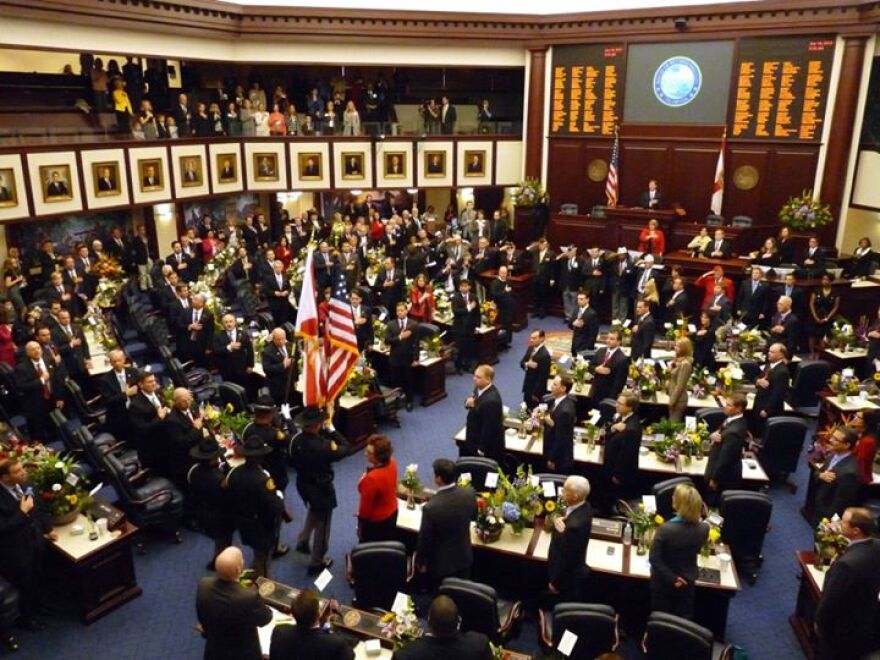Following a closely contested election, the Florida Legislature convened Tuesday in an organizational session to formally elect new leaders and get ready to deal with a new governor.
The 40-member Senate met first and elected Sen. Bill Galvano, a 52-year-old Republican lawyer from Bradenton, as the chamber’s new president. He will lead the Senate during the 2019 and 2020 regular sessions.
The House then met and electedRep. Jose Oliva, a 45-year-old Republican cigar-company executive from Miami Lakes, as the chamber’s new speaker.
While Florida drew national attention for recounts involving the governor’s race and a U.S. Senate seat, there was less drama in legislative races, although a number were closely fought. Three seats ended up in recounts, with the Democrats prevailing in a Senate race and the Republicans winning two House seats.
Galvano said it was “one of the most vigorous” election cycles he has experienced, while saying “there is a lot that has to be treated as election rhetoric.”
“That’s going to be my message on Tuesday,” Galvano told reporters last week. “I think it’s time that we put that stage behind us and come together and get some meaningful work done.”
In his remarks to the House Republican caucus on Monday, Oliva highlighted the role the GOP has played in promoting minority causes, noting he will become only the second Hispanic lawmaker to lead the House. He follows now-U.S. Sen. Marco Rubio, who led the state House from 2006 to 2008.
“We have been the people who have broken barriers. We deserve to get the credit for it, and we deserve to be proud of it,” Oliva said.
He also drew a distinction between “petty” partisanship and holding true to ideological values, while respecting the other side.
“If we allow ourselves to be told that we must learn to compromise, we will end up in an ideological mush in the center,” he said.
Galvano and Oliva, who are both veteran lawmakers, will be dealing with a rookie Republican governor. Ron DeSantis, who will take office on Jan. 8 after narrowly beating Democrat Andrew Gillum in the general election.
DeSantis, a lawyer from Ponte Vedra Beach, served three terms in Congress but has little experience in Tallahassee.
Galvano said DeSantis’ transition will be aided by his lieutenant governor, Miami Republican Jeanette Nunez, a former House leader. But he said DeSantis will face a learning curve.
“I think there is a big difference between what we do here in Tallahassee versus what they do in Washington. And for the most part, it’s a good difference on our side of equation,” Galvano said. “I’m confident he will get his footing as we go. But there are some things I think he will have to discover.”
The Democrats increased their seats in the House to 47 members but remain a firm minority in the 120-member chamber. The Senate is divided 23-17 between the GOP and Democrats.
Sen. Audrey Gibson of Jacksonville and Rep. Kionne McGhee of Miami will lead the Democratic caucuses in the Senate and House.
“We’ve worked through it before,” said Gibson, when asked about facing a Republican-led Legislature and GOP governor over the next two years.
Gibson said she has a “good working relationship” with Galvano, as the two lawmakers began their legislative careers in the House. And she said they are likely to find common ground on issues like better funding for the state college system.
But she and McGhee are also expected to back initiatives that will face strong opposition from the GOP leadership, including a renewed call to expand Medicaid, the health-care program for the poor and disabled, under the federal Affordable Care Act.
“It doesn’t mean we shouldn’t ask for it on behalf of the people,” Gibson said, saying if Republicans reject the effort they need to find other ways to address the health-care needs of more than 800,000 Floridians.
McGhee said the election is over, “but the work continues.”
“From expanding access to health care, to investing in our kids and teachers, I am confident that our team will not only fight for Florida’s hard-working families but will work towards common ground to ensure that no Floridian is left behind,” he said in a statement.
The Legislature will begin its annual 60-day session on March 5.




